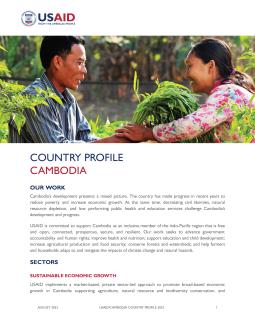Cambodia’s development presents a mixed picture. The country has made progress in recent years to reduce poverty and increase economic growth. At the same time, decreasing civil liberties, natural resource depletion, and low performing public health and education services challenge Cambodia’s development and progress.
USAID is committed to support Cambodia as an inclusive member of the Indo-Pacific region that is free and open, connected, prosperous, secure, and resilient. Our work seeks to advance government accountability and human rights; improve health and nutrition; support education and child development; increase agricultural production and food security; conserve forests and watersheds; and help farmers and households adapt to and mitigate the impacts of climate change and natural hazards.
SUSTAINABLE ECONOMIC GROWTH
USAID implements a market-based, private sector-led approach to promote broad-based economic growth in Cambodia supporting agriculture, natural resource and biodiversity conservation, and workforce development. During 2021-22, USAID programs brought economic benefits to nearly 120,000 people while mobilizing over $90 million in new investment in the agriculture and environment sectors. This includes $50 million in carbon credit sales which is providing a sustainable financing mechanism to improve livelihoods and benefit indigenous and underserved communities. USAID programs also assisted 1700 agriculture businesses and 9500 farms to increase their sales by $46 million and develop over 140 new products.
USAID/Cambodia - Sustainable Economic Growth Factsheet
HEALTH, EDUCATION, AND CHILD PROTECTION
With USAID support, Cambodia is reducing the burden of infectious diseases while increasing access to quality health services and is improving the way Cambodian children learn.
USAID support in the health sector is improving the quality of both public and private health services. Cambodia has not experienced a single malaria fatality since 2018 with USAID support through the President’s Malaria Initiative. In 2021, Cambodia transitioned off the WHO list of 30 high TB burden countries with assistance from USAID TB programs. The 2021 Demographic and Health Survey indicates US nutrition work helped reduce stunting among children under 5 years of age from 32 percent to 22 percent between 2014 and 2021.
USAID resources have supported the basic education curriculum for all Khmer-speaking children nationwide in grades 1 and 2, as well as for those with learning disabilities or who speak one of Cambodia's other five languages. To combat the COVID pandemic, the Agency has provided more than $16 million to provide personal protective equipment, improve laboratory infrastructure, support risk communication, and deliver more than one million doses of the Johnson & Johnson vaccine.
USAID/Cambodia - Public Health, Education, and Child Protection Factsheet
DEMOCRACY, HUMAN RIGHTS, AND GOVERNANCE
In recent years, USAID has trained thousands of human rights defenders and hundreds of union leaders and labor activists carrying out advocacy activities to protect basic human rights and promote core labor standards. USAID also supports citizen demands for increased public services, which have resulted in authorities taking action to respond to hundreds of formal citizen group requests. These efforts are building transparency and accountability in targeted areas across Cambodia. USAID supported 11 key NGO partners in eight of Cambodia’s most populous cities to inform and empower citizens to engage in local planning processes and prioritize their demands for improved local services. Local authorities in 64 communities are taking action to respond to these priorities.

